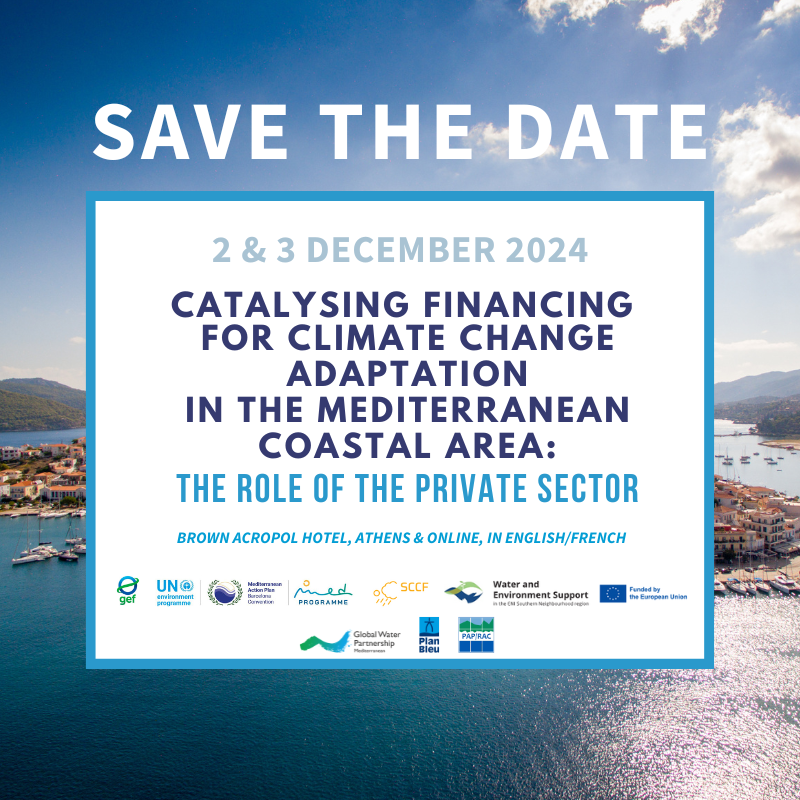The Mediterranean, including its coastal and marine areas, faces significant risks from pollution, population growth, unsustainable land and sea use. Such risks are aggravated by climate change impacts, threatening natural ecosystems and human livelihoods, leading to extreme weather events, exacerbating droughts and floods, rising sea level, increasing land loss, and agricultural damage. Key economic sectors affected include tourism, agriculture, water, fisheries, transport, manufacturing, forestry, and energy, with varying impacts such as shrinking water supplies, reduced crop yields, declining fish catches, and increased forest fires. Adapting requires, among others, integrating climate considerations into national and local strategies and mobilising required investments, including through climate finance, and engaging the private sector, to implement sustainable adaptation practices.
The private sector can engage in climate adaptation in different ways: companies of all sizes can climate-proof their operations; larger companies can invest upstream throughout their supply chain; responsible businesses can support climate adaptation actions for community resilience and ecosystems conservation; and private capital can finance investments that contribute to climate resilience transitions. Though there is a long way to go, there has never been more momentum for businesses to become more sustainable. However, there are several barriers restricting the scaling up of private sector engagement in climate action. By overcoming such barriers, private funding for climate action could be substantively increased. Mediterranean countries should use this momentum to enhance coastal planning and leverage available financing sources, including by the private sector, to accelerate adaptation action.
In that context, the Regional Roundtable on ‘Catalysing Financing for Climate Change Adaptation in the Mediterranean Coastal Area: The Role of the Private Sector’, will take place on 2-3 December 2024, in Athens & Online (Hybrid).
The Athens Regional Roundtable aims to elaborate on challenges and opportunities, roles and responsibilities as well as financing mechanisms and tools for engaging the private sector for climate change adaptation in the Mediterranean, with an emphasis on the coastal area in a Source to Sea approach. It will conclude with a set of recommendations for action for catalysing climate adaptation financing and for engaging the private sector in these. It targets stakeholders from all Mediterranean countries
The Regional Roundtable is organised in the framework of the GEF MedProgramme SCCF Project and the EU Water & Environment Support (WES) Project. It is jointly hosted by Global Water Partnership-Mediterranean (GWP-Med), Plan Bleu/RAC UNEP/MAP, and EU WES Project.
Please consult the following material of the Regional Roundtable:
- Concept Note and Agenda. Updates of the agenda will be uploaded.
- ‘Methodological Guidelines on Preparing a Financial Plan for Climate Change Adaptation in Mediterranean Coastal Areas’, elaborated by GWP-Med within the SCCF Project of the GEF UNEP MAP MedProgramme. The Methodological Guidelines aim to support countries screening, targeting and successfully mobilizing available funding sources for climate action comprising domestic, international, and private sector investment. The document is available for comments.
- ‘Assessment on Private Sector Engagement to Catalyse Financing for Climate Adaptation in the Mediterranean’, elaborated by the EU WES Team, ARCOWA and GWP-Med within the EU WES Project and the SCCF Project of the GEF UNEP MAP MedProgramme. The Assessment provides an overview on the subject and assisting in shaping recommendations for enhancing related private action and investments. These will be further discussed at the
- Practical Information Note.
If you wish to participate, in person or online, please REGISTER HERE.
For online participation via Zoom:
https://us02web.zoom.us/meeting/register/tZUkfuCvrjgvHtxTaeRkkxE3pl4EEpDLpdaW
Meeting ID: 819 9970 3548
Passcode: 12345
